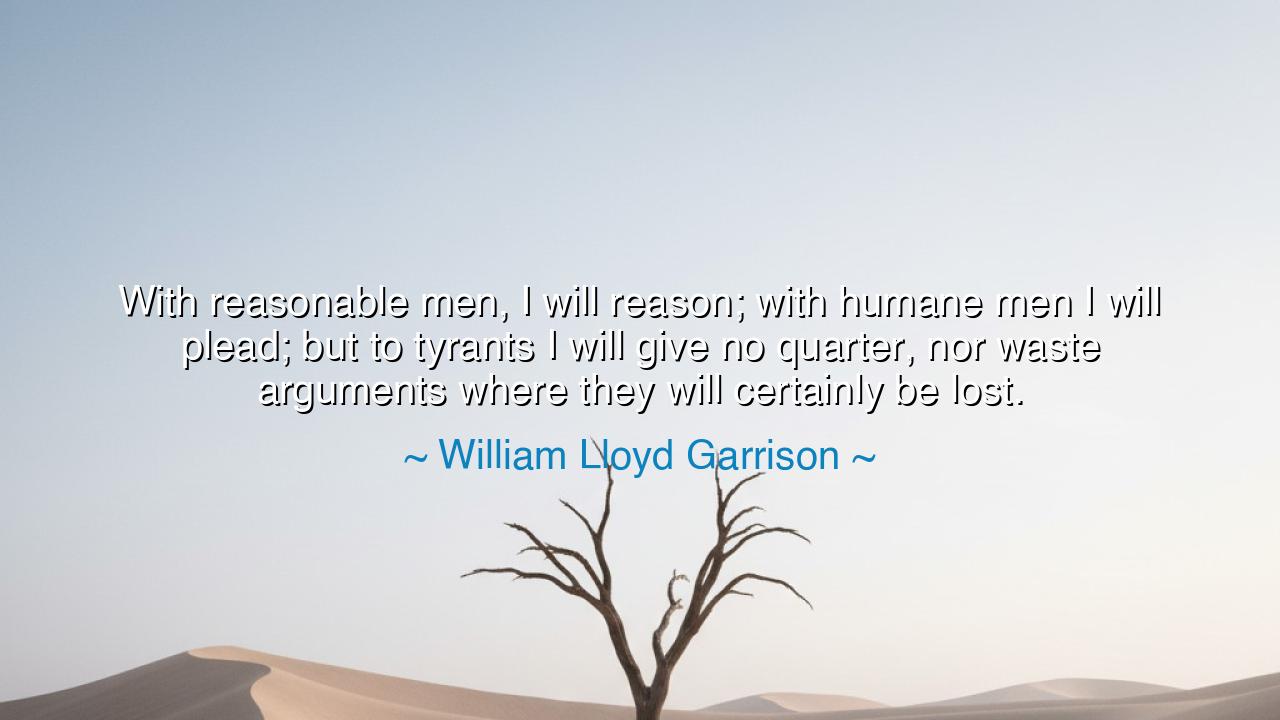
With reasonable men, I will reason; with humane men I will plead;
With reasonable men, I will reason; with humane men I will plead; but to tyrants I will give no quarter, nor waste arguments where they will certainly be lost.






"With reasonable men, I will reason; with humane men I will plead; but to tyrants I will give no quarter, nor waste arguments where they will certainly be lost." — these words of William Lloyd Garrison speak to the heart of justice and the struggle for what is right. Garrison, a towering figure in the abolitionist movement, understood that there are times in life when we must engage in dialogue and reason with those who are open to understanding, but there are also times when evil and tyranny must be confronted without compromise. His words are a call to action for those who seek justice, urging them not to waste their strength on those who refuse to listen or whose hearts are hardened by power and oppression.
In the ancient world, wisdom often emphasized the importance of reasoning with those who could be swayed. The great Socrates, known for his method of questioning, sought to reason with those around him, to guide them toward wisdom and understanding through dialogue. In his view, knowledge was not something to be dictated but to be uncovered through careful conversation, through the process of reason. Yet, he also recognized that there were limits to reasoning with those who refused to seek truth. He saw the corrupt rulers of Athens, like Anytus and Meletus, who sought to silence him not through logic but through fear, as examples of men who were beyond the reach of reason. Socrates did not plead with these men, for he knew that their hearts were closed to truth.
Garrison, too, understood this distinction. His abolitionist work, while rooted in the spirit of humanity and reason, was not about negotiating with the slaveholders of the South in the hope of changing their minds. He understood that to reason with tyrants—those who profit from suffering and inequality—was to waste time and energy that could be better spent working for justice. Like the Greek philosopher, Garrison knew that some battles must be fought not with arguments, but with action—with resistance against tyranny and oppression. His call to give no quarter to tyrants was a call to stand firm against forces that sought to degrade humanity.
Consider the example of Nelson Mandela, whose life was a testament to the struggle against tyranny. During his fight against the apartheid regime in South Africa, Mandela faced the tyranny of an oppressive government that would not reason or plead for change. His imprisonment for nearly three decades was not a result of his failure to reason with the oppressors but because the oppressors refused to listen to the pleas of the oppressed. Mandela understood that the struggle for justice required not just reasoning with those who could change, but also resistance against those who clung to power through violence and suppression. Mandela’s later acts of forgiveness and reconciliation were not about yielding to tyranny, but about leading a people through the pain of resistance toward the light of justice.
Garrison’s words also remind us that time and energy are precious resources in the fight for justice. To waste them on tyrants is to lose ground in the struggle for what is right. The great Mahatma Gandhi understood this principle in his fight for Indian independence. He did not waste time engaging with those who would not respect the rights of his people; instead, he led a movement of nonviolent resistance that gained the moral high ground and ultimately broke the chains of British imperialism. Gandhi’s strategy was not based on futile debate but on the power of moral clarity and sustained resistance.
The lesson that Garrison imparts is one of discernment. There are moments when we must engage with reason—when we must plead with the humane and seek to persuade those who are open to change. But there are also times when we must recognize that tyranny cannot be reasoned with. In those moments, action is the only path forward. This is not to say that dialogue is unnecessary, but that we must know when to speak and when to resist. The tyrant cannot be reasoned with, for they are driven by power and self-interest, not by a desire for truth or justice. It is in these moments that we must stand firm, with resolve, and refuse to give quarter to those who seek to harm others.
In our own lives, let us ask ourselves: Are we engaging with those who are open to change and reason, or are we wasting our time on those who refuse to listen? Whether in our personal struggles, in society, or in the workplace, we must be discerning in our efforts. If we face a tyrant—someone who seeks only to dominate and oppress—we must recognize that there is no room for compromise. But if we are dealing with reasonable men—those who are open to discussion and humanity—then we must engage with wisdom and compassion. Let us not waste our energy in futile battles but channel our efforts where they will have the greatest impact, fighting for justice, truth, and equality wherever it is most needed.






AAdministratorAdministrator
Welcome, honored guests. Please leave a comment, we will respond soon